Peter MALONE
Firebird/ 2021
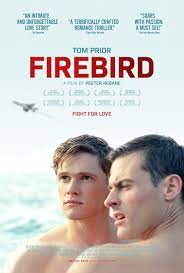
FIREBIRD
Estonia/UK, 2021, 107 minutes, Colour.
Tom Prior, Oleg Zagorodnii, Diana Pozharskaya, Jake Henderson, Nicholas Woodeson, Margus Prangel.
Directed by Peeter Rebane.
We do not see many films from Estonia. And we do not see many stories from Estonia during the Soviet occupation, especially at an Army base in 1977. But, this is the initial setting. And it is the story of a young soldier, Sir gay (British actor, Tom Prior, who co-wrote the film and acted as a producer) is nearing the end of his service, hounded by an exaggerated shouting Sergeant Major in the barracks, doing driving jobs, bonding with his friends, a keen photographer, especially as Luisa who works in the Major’s office.
But, of set purpose, this is a film about homosexual relationships. At the end of the film, there is information about legislation in Soviet times, about positive changes in 1993 but, a warning, that more restrictive legislation and suspicions were introduced in Putin’s Russia in 2013. There is a website information for audience response to the issues.
In many ways, audiences nowadays are familiar with this story and so have to travel back to try to appreciate what relationships and secrecy were like in those times.
Tom Prior is convincing as Sergey, developing his character over the six years of the film’s narrative, naive soldier, acknowledging his sexual orientation, the relationship with the pilot, Roman, his move to Moscow to audition to be an actor, his success, the impact of Roman’s marriage to Luisa – and then four years passing, Roman and Luisa with their young son, Sergey successful in Moscow – and the build up then to an emotional climax.
In the synopsis, Roman is described as “charismatic”. That seems to be something of an overstatement. In fact, the actor, Ukrainian Oleg Zagorodnii. With the touch of the iconically handsome, is, nevertheless, somewhat stolid in his screen presence and performance. On the other hand, Luisa is a much more open personality.
There are three significant military characters in the background, Sergey has a young friend at the base who is hostile to the relationship, a Major, sinister in that Soviet official way, suspicious of Roman, confronting him, asking Sergey to spy on him. He also appears at the wedding, confronting the couple. And, at the very end of the credits when most of the audience have acted on their compulsion to exit instantly, there is a momentary glimpse of the Major, a reminder of continuing sinister surveillance. But, there is also a sympathetic official, played by Nicholas Woodeson, familiar from many British films, who reveals that he has always known what was happening but did not let that influence his decision-making.
There are two sequences from Stravinsky’s, Firebird, symbolic – but, perhaps, not for those unfamiliar with the ballet.
A contribution to dramatising the realities and emotions of same-sex relationships and a reminder of past (and present) repressions.
- The title? References to Stravinsky’s Firebird, performance sequences, the end? Themes and symbols?
- Estonia, 1977, Moscow 1978, Moscow during the 1980s? The military base, the meagre apartments, drama school in Moscow, theatre and performance, more lavish apartments? Military action, flights, difficulties? The musical score?
- The film highlighting homosexual relationships, legislation in Soviet times, Soviet-occupied countries, change of legislation in the 1990s, imposition of stricter regulations in 2013? The attitude of Putin’s Russia? The appeal for freedom, the information at the end, the website for affirmation? And the sinister final image after all the credits and the presence of the major with his suspicions?
- A true story, based on Sergey’s memoir, 1996, A Tale about Roman?
- Sergey’s story, in the military, away from home, the possibility of returning home after service, yet his ambitions to be an actor? His tasks, driving? Barracks’s life, strictness, the shouting Sergeant Major? His range of friends? His friendship with Luisa? His love of photography, outings with his friends, with Luisa?
- The arrival of Roman, his status as a pilot, presentable? Sergey driving him? The attraction? Their being together, discussions, Roman making the approach, the kiss? The effect on Sergey? Finding the time to be together, the sexual encounter and its effect? The major arriving, already expressing his suspicions to both Roman and Sergey? His receiving the report, interrogating Sergey and asking him to spy on Roman? The search of the apartment, Sergey hiding under the photographic equipment? The next day, Roman’s sternness and rejection of him?
- Sergey, going to Moscow, Luisa and her attitude? The audition, finding friends, the performances?
- The invitation to the wedding, Roman and Luisa, Luisa explaining to Sergey? At the wedding, his being upset, the conversation with Roman, the major coming out and confronting them?
- Four years passing, Sergey and his life in Moscow, performance, achievement, the drama teacher, the lessons, miming?
- Roman coming to Moscow, the tensions with his wife, but his love for his son? Coming to the theatre, Sergey and his reaction? Roman offering the apartment, making it their home, lavish? The celebration, the friends all present? The friends seeing Roman and Sergey together, his disgust, leaving, revelations was he who put in the initial report to the major?
- Roman and Sergey together, the lyrical scenes, at the beach, the water? Sergey’s fear that Roman had drowned?
- Roman leaving, the letter, Sergey away, receiving the letter, phoning, the discovery that Roman had gone to Afghanistan, his death?
- Visiting Luisa, the boy, the tensions, the bonding between Luisa and Sergey despite their experiences?
- The crusading aspect of making the film and its release, the final information, the website?
- And the impact of the brief glimpse of the Major, the reminder of sinister surveillance even in contemporary times in Russia?
Ablaze
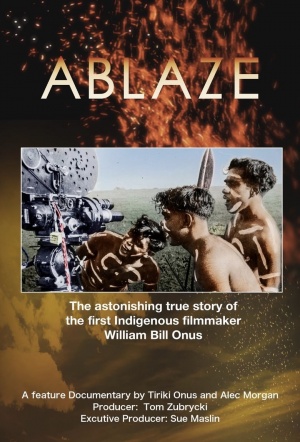
ABLAZE
Australia, 2021, 81 minutes, Colour.
Directed by Alec Morgan and Tiriki Onus.
Very glad to have seen this striking and interesting documentary introducing a highly significant First Nations advocate for rights from the 1930s to the 1960s, Bill Onus, a Yorta Yorta and Wiradjuri man from Victoria, dying soon after the 1967 referendum. The film is directed by Alec Morgan who, almost 40 years ago directed Lousy Little Sixpence, a documentary about the stolen generation. His co-director and narrator of the film is the opera singer, Tiriki Onus, the grandson of Bill Onus (and sings the role of his grandfather in Deborah Cheetham’s opera, Pecan Summer, an excerpt included in this film).
Three reasons for recommending this documentary.
The first is its representation of indigenous Australians in film footage from the 1930s and 1940s, found in the National Film Archive in Canberra, film shot by Bill Onus, who had his own camera, and also took many photos. His grandson finding a lot of this material in a suitcase in an attic. Quite some archival treasures found in it. And we have the opportunity to see this material, especially as Tiriki Onus shows it to a wide range of people for their comment, archivists, historians, World War II experts, Uncle Charles, family members, neighbours from Fitzroy. There is identification of where some of the material shot, especially when Bill Onus lived in Fitzroy, but capturing images of aboriginal soldiers, many of whom spent years in prison on the Burma Railway, and what happened after their return – and lack of recognition.
Bill Onus was very concerned about social issues over these decades, speaking at every opportunity, travelling, filming and dramatising in a filmed play the first aboriginal strike in 1946 in the Pilbara – and Titiki returning to show them the film. Interestingly, the film highlights how Bill Onus may have been the first indigenous cinematographer, working with Charles Chauvel in the 1930s on Uncivilised, British director, Harry Watt, getting his advice for the classic, The Overlanders, trying to find ways of public exhibition of his films, in later years having a television program, telling aboriginal stories to camera.
The second reason for recommendation is for non-indigenous Australians to learn more about the history of the aboriginal peoples, the invasion/colonialisation of Australia, some appalling examples of white superiority, segregation behaviour, some slavery and punishments, the challenges by Bill Onus, supported by his Communist Party wife and her fiery enthusiasm. There is a great deal of material here for contemporary Australians to examine the consciences of the past, confess to these abuses and find ways to make atonement, for restorative justice.
The third reason for recommendation is the archival work. Archives need to be established, to be cared for, to be made available for the kind of research that results in this film. It is exciting for researchers to make personal contacts, for interviews, for identification of characters within the film is (as happens here with the most decorated of the aboriginal soldiers as a tram conductor in Melbourne after the war, in becoming more involved in justice campaigning), for finding the clues, like him into finding buildings in Fitzroy, that helped to re-create the look, the sound, the realities of the past. (This particularly appeals to this reviewer, long involved in research, an example from this film is seeing the movie posters, especially for The Hard Way in the post-war tram (released in 1943 in the US), and the cinema screening My Man Godfrey, 1936.)
Titiki Onus is an engaging personality, friendly, earnest in his research, making every effort to show the film to a range of people, get their advice, but provide a rounded portrait of his grandfather and a tribute to his energy and achievement.
Killing Escobar
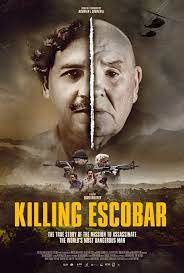
UK, 2021, 93 minutes, Colour.
Paul Donnelly, Christian Jenner, Diego Landaeta.
Directed by David Whitney.
While this is an interesting documentary, the title is completely misleading. It is about a group of mercenaries hired by the cartel in Colombia in 1989, training in the mountains and jungles for an attack on Escobar’s hacienda to eliminate him. In fact, the mission was a failure. The main helicopter crash landed informed in the jungle, necessitating a demanding rescue of the leader of the group, and eight hours climb down the Mountain. If the British sense of humour intended the title to be ironic because of its failure, this kind of irony was lost on the potential viewers, military types who wanted strong action.
Many documentaries into the 21st-century have been marked by the use of audiotaped interviews with central characters, material not previously available, quite abundant material in the number of hours of interviews. This is the case in such films as Joe Berlinger is Conversations with such serial killers as Ted Bundy and John Wayne Gacy.
This documentary is marked by the amount of footage that the organiser of the mercenary squad, David Tompkins, filmed at the time. These are intercut with re-enactments of some of the action, especially the rescue of the leader, Peter McAleese.
Tompkins is interviewed in 2020, as is Peter McAleese, who is a good yarn-teller. McAleese tells his story at some length, step-by-step, focusing on the crash of the helicopter and his need for rescue and going back to the plan for the assassination, the role of the rival cartels in Colombia, David Tompkins and his getting a squad together, McAleese himself as the leader trainer, some of the other members of the group, some lax behaviour initially, strict discipline and training imposed. However, the mission was a failure, Escobar himself being shot by police for years later.
At the film had another title, it would be an interesting look at the role of mercenaries in the latter part of the 20th century, their personalities, motivation, eagerness to fight, huge payments. And, McAleese continued his story to the present, talking about his strict father in Glascow, testimony from his sister, images of Glascow, his Catholic background, and in later years returning to his faith, seen in church.
Because of the title and the failure of the mission many would agree with one blogger who dismissed it as a film about “a bunch of losers”.
Bergman Island
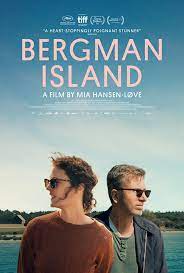
BERGMAN ISLAND
France/Sweden, 2021, 107 minutes, Colour.
Vicki Krieps, Tim Roth, Mia Wasikowska, Anders Danielson Lie.
Directed by Mia Hansen-Love.
This is a drama made for devotees of master filmmaker, Ingmar Bergman. Faro, off the coast of the Swedish mainland, is his island.
The screenplay contains many references to particular Bergman films, to their making, to their themes and characters, to locations, and the revelation that Through a Glass Darkly was made in a studio. The island provides a Bergman safari and the audience is treated to some aspects of this tour.
However, the rest of the Bergman connections take place in the context of a married couple, screenwriters, coming to the island for their work. They are played by Vicki Krieps and Tim Roth. He is the more laid-back are the characters, involved in production, more in mainstream and horror films than arthouse fare. She, on the other hand, is quite tense, often moving out of the house to a separate tower to continue her writing. The film dramatises the tensions between the two, the husband leaving her alone on the island, but returning with their daughter and with some sense of realism to their life.
As the wife continues with her writing, touring the island, visiting the Bergman memorials, discussions with some of the locals as well as the experts, she begins to shape her screenplay.
This then is dramatised as a film within a film, with Mia Wasikowska and Anders Danielson Lie as the protagonists, a complex Bergman-esque story of relationships, moods, betrayals, suspicions…
Ultimately, there is a blend of the film within the film and the actual film narrative, the production, scenes being shot, socialising and parties, the actors leaving.
Which means then the audience is treated by the writer-director, Mia Hansen-Love (Goodbye First Love, Things to Come), to reflections on Bergman and his cinematic achievement, technical and themes, and to the kinds of screenplay and tangled relationships that Bergman himself was interested in.
- The title, Sweden, the island of Faro, the home of Ingmar Bergman?
- The Swedish landscapes, the ferry across the sea, the island, landscapes, seascapes, the countryside, the homes, the meal, the wedding? The locations associated with Bergman? The musical score?
- The film depending on audience knowledge of Ingmar Bergman, is films, his themes, his reputation, is personality, religious background, Lutheran, issues of faith and not, ghost presences, personal relationships, his wives, his children, his long life?
- Audiences not knowing anything about Bergman, the film raising interest, curiosity? Or not? Too esoteric for those who do not know Bergman?
- The bus, the Bergman Safari, the various locations, the film itself is a Bergman Safari, his home, the interiors, the room and bed four Scenes from a marriage, the references to Bergman films? Tony and Chris watching Cries and Whispers? The references to other films? Posters, portraits, photos of actors?
- The audience journeying with Chris and Tony, age, relationships, screenwriters, welcome to the island, the committee, the discussions, Tony and his horror films screening, the response of the audience? His writing another screenplay, the close-ups of his notes, Chris turning the pages, the themes, the erotic drawings? The contrast with Chris, writing notes, blockage, emotional?
- The relationship between the two, love, taken for granted, the flight, Chris upset with the flight, the drive, the ferry, hiring the car, the bikes, the house, settling in, her going to the mill, writing their, the windows looking across?
- The Bergman experts on the island, the Festival, the discussions? The 35mm prints? The Safari, Tony going, Chris not going, meeting the student, his taking her to the church, Bergman’s grave?
- Chris, the difficulty in writing, the discussions with Tony, going for the walk, the film within the film? How Bergman-esque? The crosscutting from their conversation to the sequences of the film?
- The theme of the film, Amy and joseph, the teenage relationship, breaking up, separation, taking the relationship up again, coming to the wedding, Joseph and his relationship with his girlfriend, Amy and her having a child? The arrival, the meetings, pretending not to know each other? The preparations for the wedding, the issue of Amy’s white dress and wearing it or not? The discussions with Nicolette? Accommodation?
- The taking up of the relationship, the various meetings, the sexual encounters, the consequences? For Joseph, conscious of his girlfriend? For Amy, able to cope with different relationships? The attention to detail, the time together, at the water, swimming, the sauna, with their friends, into the ocean?
- The dramatising of Amy, her age, personality, vivacious, entering into the life of the party, singing, yet missing joseph? The contrast with Joseph, and ring the relationship, the resumption, then his moods, in and out? The final conversations? His leaving?
- Tony, going back home, meetings with the producers, getting his daughter, coming back to the island, the daughter rushing to Chris, Chris happy with her daughter?
- And the interconnection of the film within the film and the film itself, Chris and her work on the film, the real Anders and Mia, the discussions, Anders and his leaving?
- The film highlighting Bergman as the great director of the 20th century, is themes? How relevant to the pace and life of the 21st-century?
Hero, A
A HERO
Iran, 2021, 126 minutes, Colour.
Amir Jadidi, Mohsen Talabandeh, Sahar Goldust.
Directed by Asghard Fahradi.
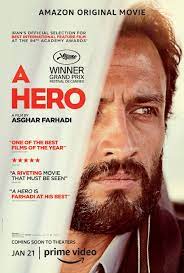 With Oscar-winning writer-director, Asgard Farhadi’s previous films, A Separation is not quite a separation, The Past is not exactly the past, and The Salesman has echoes of Arthur Miller’s Death of a Salesman. So, what are we to expect from this very plain title, A Hero or a hero?
With Oscar-winning writer-director, Asgard Farhadi’s previous films, A Separation is not quite a separation, The Past is not exactly the past, and The Salesman has echoes of Arthur Miller’s Death of a Salesman. So, what are we to expect from this very plain title, A Hero or a hero?
The ordinary audience is invited into the atmosphere of an Iranian city, not exactly the atmosphere that media headline suggests, not the world of nuclear developments and sanctions. Rather, this is a small story, a local story of a man on leave from prison, sentenced because of his not paying back a debt to his partner.
The director is very shrewd in his casting. Rahim, played by Amir Jadidi, has a genial smile almost all the time, quiet, seemingly sensible, hard done by in his setting up his company and its failing, enduring prison. Whether he is a hero or not, everyone, the audience included, is charmed by his smile.
Well, not quite everyone. His partner is a bitter man, hostile to Rahim, trying to put him down at every turn, especially to the police and investigators. His antagonism also antagonises the audience.
However, Rahim is estranged from his wife, his sister and her sympathetic builder husband, are looking after his little son who has a speech impediment. Rahim has met a woman in prison and hopes to marry her – though her family are quite hostile to him.
The heroism concerns a purse with gold coins in it, Rahim reporting this to the bank, a distraught woman coming to claim the coins, the prison authorities proud of him and his generous gesture, and the media having more than a field day. He has become not a hero, but the hero, everybody recognising him.
But, as has been said with Fahradi and his films, A Hero is straightforward title is far more ambiguous, and this is the case here, following up the investigation of the finding of the coins, his collaboration with the woman from prison, the effect on his antagonist, the effect on his family, especially his son. The hero becomes more desperate.
While this is an Iranian story, it is also universal story – and has universal interest and appeal. Co-winner of the Cannes Jury Prize, 2021. And a strong reminder of how good uranium films have been for many decades.
- The work of the Director, Oscar awards, multi-awards?
- The titles of his films, simple, yet ambiguous?
- The Iranian setting, the city, the vastness of the archaeological work, homes, interiors, prisons, the streets, ordinary life? The prison, offices? Police precincts, the bank? The musical score?
- The title, the introduction to Rahim, smiling, genial, gentle in manner, seeking out his brother-in-law, for work, financial support, his leave from prison? The background to his case, setting up the company, failing, in debt, the anger of his creditor? The creditors daughter? His going home, the relationship with his sister, his ex-wife, his son and the speech impediment? His visit for several days?
- His background in prison, the prison officials, their attitude towards him, supportive? His meeting the woman in prison, the relationship with her? Meetings? Her family, hostile towards Rahim? The issue of the gold coins, the purse? The attempt to pawn the coins, the calculator not working, the pencil not working, not selling the coins?
- Rahim, the plan with the coins, the woman not wanting to go to the bank, his tentative approach, the questions, statement about finding the coins at the bus stop? Printing and distributing the posters?
- The phone call from the woman, her visit, distraught, the story of the coins, verification, the taxi driver, Rahim’s sister, his son? The gift of the money to the boy? Later tracking down the woman, the taxi driver and his help? Identification of the woman?
- The difficulties with the creditor, the support from the prison authorities for the payment, the creditor refusing, denouncing Rahim?
- The media, the interviews, the television station, everybody recognising Rahim, his modest response?
- The inconsistencies of the story, the woman, going to the police, verifying the story? The creditor and his daughter, continued hostility, denunciation? The effect on his sister, brother-in-law and his continued help, dismay? His son, witnessing?
- The complexities for the prison authorities, publicity, the media?
- The resolution of the story, Rahim and the family, his son, the creditor, the woman friend, returning to prison?
- The complexities and ironies of the title?
I Am Johnny Cash
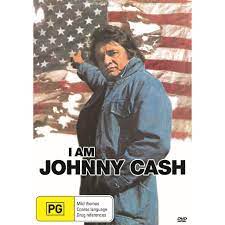
I AM JOHNNY CASH
US, 2015, 86 minutes, Colour.
Kris Kristofferson, Willie Nelson, Kid Rock, Sheryl Crow, John Mellencamp, Merle Haggard.
Directed by Derik Murray, Jordan Tappis.
One of the entries in the interesting and successful steering series, I Am… These have included film stars, show business personalities, and a number of politicians including John Kennedy Jr and his mother, Jacqueline Kennedy-Onassis.
These films rely on a great deal of archival footage and this is the case here, Johnny Cash’s life, his concerts and his range of singing, his drug dependency, his time in prison, his rehabilitation, his work as a Gospel singer, association with Billy Graham. There is his personal life, attested by his daughter, Rosalynn Cash, images of his first marriage and children. However, the important person in his life was June Carter and there is footage of her, her singing, career, testimonies from her family.
It is interesting to note the willing number of talking heads from the music industry, all with high opinions of Johnny Cash. Also interesting to note is his television program and the range of guests he added, sometimes at the displeasure of the network, but including Pete Seeger, Joni Mitchell.
Some other singers give versions of Cash’s songs, especially Sheryl Crow and Kris Kristofferson.
Perhaps the filmmakers go rather more easily on Cash’s drug addiction, though this is explained in some detail, his alcoholism, his womanising.
However, for audiences interested in learning something about Johnny Cash, this is a good introduction.
Waco; Madman or Messiah
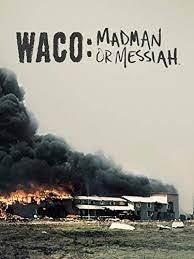
WACO: MADMAN OR MESSIAH
US, 2018, 180 minutes, Colour.
Mike Caruso, Chris Urquhart, Elizabeth Stuart-Morris, John Pucci, Abby McDonald, Fabricio Prado, Reese Presley, Charles Cameron, Audie Grant, Alexandra Brown, Andre Latour, Carolyne Rheaume.
Directed by Christopher Spencer.
A vivid documentary looking back at the attack on Mount Kumble, the community of the Branch captive Indians, under the leadership of David Koresh, for re-March 1993. Here the story is told with 25 years retrospect.
A large cast does re-enactments of the main characters – while the actual selves are interviewed in 2018.
While there have been dramatic reconstructions of the attack and the siege, and a great deal of newsreel footage at the time, the adventures of this film is that it has a great number of recorded interviews between David Koresh and the FBI as well as with a number of other members of the community. This documentary is airing many of these tapes for the first time.
Along with video clips of David Koresh himself, delivering lectures, with his wives and children, there is a great deal of footage of the community during the 1970s and 1980s, into the 1990s. The narrative provides a historical background to the origins of the community, the 1950s, belief in a second coming, belief in chosen people resisting the world and living in community. There were various leaders interpreted as prophets, including the widow of a prophet who then had a relationship with Koresh when he joined the community. However, Koresh took over, even in his 20s.
The documentary also provides background to Koresh, his family, parents, siblings, his growing up, going on the road, his particular conversion experience, changing his name.
There are also many talking heads, 25 years older than at the time of the siege. This includes several of the community members, involved in the siege, all brought out from the community and not dying in the final blaze that consumed so many of the members – and was information that David Koresh himself had been shot in the head. Several of these talking heads are still firm believers in their community and in the role of Koresh, is the presence of God in the world, as another Christ, dying at the age of 33 for his people.
It is hard to gauge quite why the FBI and other agencies went in so heavily against the community, local hostilities, suspicions of cults and cult leaders. There is plenty of newsreel footage – but, most helpful is the commentary from the journalist, initially not willing to pursue the story, coming from Dallas,. He gives a quiet and intelligent, somewhat detached commentary on the events.
The attack on the siege took place over 50 days, attempts at communication with Koresh and the community, plans to bring out some of the children, some of the adults. But, audiences will appreciate the patience and communication of the chief negotiator, Bill Sage, who comments from his 25 years vantage point. However, the main officer in charge of attack and rescue, seems particularly gung ho, then and now.
During the 2010 is, a number of documentaries were made taking advantage of FBI and other conversations, often quite at length, with those concerned. Joe Bellinger, for instance, made two very interesting documentary is in Conversations with Ted Bundy and with John Wayne Gacy.
Mother Mountain
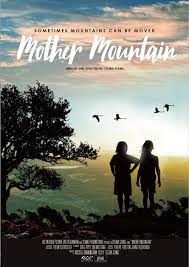
MOTHER MOUNTAIN
Australia, 2021, 105 minutes, Colour.
Emilie Cocquerel, Fayssal Bazzi, Anne-Louisa Lambert, Willow Spears, Jarrah Finnerman, Pip Miller, Damion Hunter, Angeline Penrith.
Directed by Celina Stang.
The mountain of the title is found on the South coast of New South Wales, the Tilba area and there is photography at various times on the coast including Bermagui. The mountain is a sacred site for the First Nations people who live in the area, a sense of affinity with the land and a boating presence.
This film is the first feature film by writer-director, Celina staying, based on her own experiences and her relationship with her family. Her intensity is felt throughout the film through her central character, Selene, played by Emilie Cocquerel.
At the opening of the film, Selene and her husband, Dean (Fayssal Bazzi), who has a diplomatic career, are moving from the city with their daughter, Shani (Willow Spears), a youngster who is resentful of having to move from the city and her friends, loving her mother yet clashing with her. There are ordinary scenes at home, meals, taking Shani to school – though Selene frequently forgets to collect her daughter from school. In fact, the character of Selene is a challenge to the audience, sometimes sympathetic, oftentimes moody, wandering, brooding, intending to write but not doing so, wandering along the shore and encountering a fishing trawler, Jonah the captain (Damion Hunter). She reminisces about trawling on a kibbutz in her young days in Israel. She joins Jonah and finds the experience of fishing and sorting exhilarating. Her husband doesn’t find it exhilarating – nor does her mother. And we are made aware of the tension between mother and daughter with the mother ringing, not leaving a message, Selene angry and hanging up.
While Shani experiences some bullying at school, she makes a friend, Ren (Jarrah Finnerman) and they bond, sharing their experiences, Selene meeting Ren’s mother (Angeline Penrith), an aboriginal family – and happy discovery that Jonah is Ren’s father.
One day, early in the morning, her mother and father turn up, wanting to celebrate Shani’s birthday. There are some explicit angrily confronting sequences between mother and daughter, and whatever difficulties the audience has with Selene, they will have far more difficulties with her mother, a self-righteous dominating woman, tentatively sure that she is right. Her husband takes something of a back seat in the disputes. The mother is played by Anne Louise Lambert (audiences, perhaps, remembering that it is almost 50 years since she was Miranda in Picnic at her Hanging Rock).
How can a family come to some kind of resolution and peace? Concessions on both sides, or is that impossible? The experience of a death and its consequences? Better understanding of husband and daughter? Or, something of all the above.
It is interesting to note that explicitly Jewish themes have not been very strong in Australian films despite the significance Jewish presence in Australia. This film is quite explicit, religious language, memories of kibbutz is in Israel, and prayers and the Jewish meal.
Striking to look at, emotionally involving, and challenging.
- Title, the presence of the mountain, the visuals of the mountain, the sounds of the mountain, tracks within the mountain? Aboriginal themes?
- The location photography, the south coast of New South Wales, towns, beaches, fishing and trawling, restaurants, homes and farms, school? The musical score?
- The first film of the director, her personal story, Jewish background, the linking of Jewish persecution to Australian treatment of aborigines?
- Selene’s story, gradually filling in the background, her grandparents and the Warsaw ghetto, the gas chambers? Her mother, strict, putting her down? Selene’s resentment? Her father, strong presence, weak presence, resentments? Kicking over the traces? Her first marriage, husband alcoholic, the birth of Shani? The separation? Meeting Dean, marrying, their son? His international work? The decision to move to the south coast, the farm, settling in, everything in order? Yet her tensions?
- Selene, her angers, underlying rage and resentment, her mother, her parents, her ex-husband? Moving, wanting to write? Yet unsettled, loving Dean yet not able to manifest it? His needs? Alone, thinking, the beach, the trawler, meeting Jonah, the conversation, her past and the kibbutz, going fishing, exhilarated? And her mother’s and father’s looking down on her for this?
- Selene and her love for her son, his age, tending him? Interactions with Shani, her age, not wanting to move, accusing her mother of not listening to her, wanting the Internet, missing her friends? Yet her love for her mother, sketching, going off alone? Not wanting to go to school, the boy talking to her, and insulting her? The welcoming teacher? Ren, talking with her, friendly, the fort on the beach together, comfortable with each other, his going into the water? His parents, Selene going to visit, talking with Ren’s mother, discovering Jonah his father?
- Shani, fear of horses, the bolting course, her being dared to get on, riding, the parents’ reaction, success?
- Dean, the outing, the dancing, the scuffle with the man eyeing her, the help from the manager of the shop? Dean, talking to the young woman, Selene and her resentment, reactions? This continuing during the birthday party? The happiness of the party?
- The phone calls, from her mother? Their sudden arrival, the effect? The character of Linda, harsh, her manner, controlling? Her husband in the background, strained relationship with his daughter, the effect on his heart, his death? Selene and her grief, the presence of the funeral?
- Dean, the trips, his absences?
- The ex-husband, phoning Shani for her birthday, taking her from school, Selene confronting them?
- The aftermath of the funeral, her mother breaking down, talking, her mother looking dishevelled, in the rain, their bonding? Shani and the three generations of women?
- Hopes, her writing, the family, ran in Shani playing? A future?
Tree of Blood, The
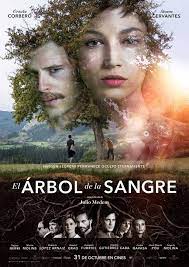
THE TREE OF BLOOD
Spain, 2018, 130 minutes, Colour.
Alvaro Cervantes, Ursula Corbero, Patricia Lopez Arnaiz, Joaquin Furriel, Lucia Delgado, Luka Peros, Najwa Nimri, Angela Molina.
Directed by Julio Medem.
Julio Medem is a significant Spanish writer-director (Red Squirrel, Sex and Lucia). This is a rather ambitious film and has a running time of over two hours, immersing the audience in a very complex story and exploration of the past.
There is a visual of the tree of blood with the two central characters, Marc and Rebeca, embracing it as the film opens. They are at her house of a deceased writer, who had married Marc’s mother. The two do have decided to tell their family story so that they can make a complete narrative, telling the truth, revealing secrets.
One of the complications is that at the end of the Civil War in Spain, a number of Spaniards were taken to Russia and the Soviet Union, some of them moving into crime, especially with the next generation, some of whom return to Spain. This is particularly the case with two brothers who become involved in each side of the family.
There are wedding sequences, the two storytellers meeting in the past, friends over a period, then becoming lovers, now deciding to share their stories.
Audiences will find a number of the characters from the past quite intriguing.
However, there are some secrets, some flaring up of angers, a movement towards full revelation and truth – some exorcising of the ghosts of the past, some hope for the future.
- The title, the visuals of the tree, Marc and Rebeca embracing it? Symbol of the family tree and the telling of the story of the families?
- The settings, the house in the mountains, interiors, a countryside? Family backgrounds, homes, beaches? Publishing houses? Restaurants? The musical score?
- The opening, the decision to tell the truth, reveal the secrets, the family narrative? This continuing throughout the film, Rebeca typing, each talking? The range of flashbacks, within each family, and the surreal scenes where Marc and Rebeca were present to the past?
- The background of the Civil War, the Spanish children sent to Russia, growing up there, some returning, criminal element, drug dealing, killings, taking over of homes? Infiltration? The patriarch, his returning to Spain, his wife, her mental condition, present, memories of playing the piano, her scene at the piano? His control over his sons? Present at the wedding is? The background of manipulation, killings, Olmo and Victor as assassins?
- Rebeca’s story, her mother, popular singer, drugs, the one night stand, the difficult birth, operations for the daughter? Her growing up, her mother and her hearing voices? The encounter with Victor, stating he was a fan, coming to the home, looking after them both, caring for Rebeca as a daughter, her calling him dad, his care for Macarena, to the institution, bringing her home, the issue of the voices? The buildup to the wedding? Macarena’s parents and their presence? Subsequent life, Rebeca growing up, Victor devoted? Taking in all my, his presence, Rebeca’s obsession with him?
- Marc’s story, his mother, the relationship with Dimitri, his being killed? Olmo as the chauffeur, driving her away, the encounter on the beach? The later revelation that he was Marc’s father? His mother, publisher? The encounter with Amaia, the relationship with Olmo, their wedding, married life, the wedding, his parents? Amaia and her research, learning more about the Spanish in Russia, the return, the crimes? Writing the novels, her husband’s reaction? Her working with Nuria, beginning the relationship, the eventual wedding, Olmo attending with the suit from his first wedding, Rebeca going?
- Marc and Rebeca seeing each other when they were young, the weddings, getting to know each other, sharing, in love?
- At Amaia’s house, the writing of their stories? The sexual relationship, two years? Rebeca’s devotion to Marc after the accident, at his bedside? The block, Marc and his resentment? Their both going home? Marc with his mother, Rebeca with her mother and Victor, with Olmo in the house? Her wanting to go away with Olmo?
- The targeting of the cars, the crash, Nuria and her injuries, telling the truth, her dying? Anaia surviving? Marc, rescued, hospital, his injuries, needing transplant? The discussions with Rebeca, the blood type? His love for Rebeca? His decision, racing to the wall, his injuries, the gift to his son?
- Macarena’s parents, in the car, hitting the cow, her mother’s death?
- The revelations, the father, his shooting his wife, shooting himself?
- The accidents, the aftermath, the revelation of the truth? Future?
Father Stu
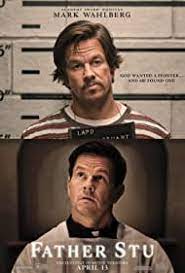
FATHER STU
US, 2022, 124 minutes, Colour.
Mark Wahlberg, Mel Gibson, Teresa Ruiz, Malcolm McDowell, Jacki Weaver, Cody Fern, Aaron Moten, Carlos Leal.
Directed by Rosalind Ross.
To get the best value out of watching this film, this reviewer suggests that, if you do not know anything about Father Stu, don’t look up anything, go to see the film and share the complexities of Stuart Long’s life and life choices. You will have mixed emotions along the way. But the ending will be credible. For many audiences, quite moving.
The film is based on a true story and, as with many of these films, there are photos and video clips of the central character during the final credits. And, given the story, it is helpful to see these clips and listen to Father Stu’s comments. The project has been a labour of love for Mark Wahlberg who invested his money in the production. He has also invested a great deal of personal energy in his performance, probably the most demanding so far in his career. And he is persuasive in the very different stages of Father Stu’s life. And, in support, he has Mel Gibson (always a strong screen presence) playing Bill Long, a negligent father, a drinker, labourer, putting down his son. And there is Jacki Weaver, full of emotions, as Stu’s mother. Both parents are grieving the death of their other son, aged six.
And here is another caution, especially those who have high sensitivities concerning what classification authorities name “coarse language”. There is a lot. However, it reflects so much of everyday language these days, and is typical of the characters and their emotions (a priest in confession actually giving the advice to Stu to clean up his language). But, sharing Stu’s journey means accepting that this is his life, that this has been his language.
The early part of the film, as expected, especially for audiences who know that he began life as a boxer, focuses on his career, its coming to an end, his not having any particular post-boxing aims in his life, deciding to go from his home in Montana to Los Angeles for an acting career. It doesn’t work out that way at all. Although he does get to appear in a commercial for a mop, to his mother’s dismay. He works in a shop selling meat, tries to charm customers, clashes with people, gets into fights… Not much prospect here.
Stu comes from a family with no religious background, something of an antipathy towards a cruel God with the death of their son. And Stu doesn’t seem to have many clues about religion but is attracted by Carmen (Teresa Ruiz) who teaches children in the local parish. Stu sets his eye on her – and who would believe the road that this attraction would open up?
And, for a religious audience, this is where the film comes into its own. And, it is interesting that a non-religious audience, who can readily identify with Stu and his life and stances, will be challenged about the mystery of God, the mystery of suffering, especially in the Catholic context.
There is an interesting character, Monsignor Kelly, played by Malcolm McDowell (50 years after A Clockwork Orange!) And Aaron Moten as Ham, a sympathetic friend and seminarian, and Cody Fern as a rather prim and pious seminarian (but the screenplay does not neglect some resolution for his character). Audiences will find the seminary sequences more than interesting.
So, Mark Wahlberg, has to play boxer, cheeky young roustabout, attempted charmer, aggressive fighter, experiencing a deadly motorbike accident, having to discover more meanings in his life than he would ever have dreamed.
This is a film that many audiences will have to be patient with, maybe not the kind of film they are expecting, but sharing the life of this “ordinary” man and his struggle to find fulfilment in his life, his struggle with illness and death – and his continual reference to Jesus on the cross for the meaning of our suffering.
- The title? Direct? The performance by Mark Wahlberg? His investing in the film?
- Based on a true story? The final credits, the photos, the video clips of Father Stu?
- The credibility of the story, Stuart Long, background in Montana, family life, his father putting him down, negligent, his emotional mother? His boxing career, local, moderate successes? Older, physical conditions? Retiring? Not knowing what to do?
- The scenes with his father, as a boy and his of his Elvis impersonation, his father’s putdown ? Seeing his father driving, at work, Stu confronting him on the worksite? The conflict between father and son? His accident, his father coming to the hospital, later coming to terms with his son, the return to Montana with his debilitated health, participation in the ordination, seeing Stu to the Care Home, going to AA, finally dancing with his wife?
- The scenes with his mother, her emotions, at home, the loss of their young son, the father’s grief, blame on Stu? The boxing career, sorting out his future, to Los Angeles, the phone calls, seeing him on the mop commercial? The accident, her coming to Los Angeles? The dismay about Carmen, religious issues, language about God? Taking Stu back to Montana, life at home, caring for him? The ordination?
- Stu, personality, Mark Wahlberg’s performance, the range in age, emotions, physical health and deterioration? As a boxer, the bouts? Health, going to Los Angeles, sure of himself, aiming to be an actor, the job selling the meat, discussions with the owner, charming the customers, the altercation with Carmen? Auditions, the physical propositioned by the agent and Stu smashing the camera? Losing his job?
- The notice about the Catholic Church, Carmen, his going, talking with her, meeting Ham, their discussions, growing friendship? Going to the church, the class with the children? The priest, at Mass, Stu awkward, stamping on the foot of the parishioner? Listening to the homilies of the priest, images of the crucifixion, God, suffering, sharing human pain? Carmen giving him the rosary beads? The meeting, falling in love, his visit to her parents?
- The accident, severity, injuries, his experience of the image of Mary helping him, the scene in the bar with the stranger, drinking only water, challenging him, a Christ-figure? The recuperation? His parents coming to visit, Carmen and her support, his mother’s antagonism?
- The issue of baptism, his agreement, instruction, the immersion ceremony?
- Stu, the change after his accident, a kind of Damascus experience? Carmen, the distance from them? Her visiting him, the sexual encounter, his going to confession?
- The decision to be a priest, sending the money, IOU to Msgr Kelly? The rejection, going to his office, confronting Msgr Kelly, discussions about the church, belief, priesthood?
- The seminary sequences, credibility, the years, spirituality, Stu and suffering, the crucifixion, his homily as a student and speaking of the crucifixion and God’s love? Classes, sport, meals, the seminarians together? The visit to the prison, Jacob’s awkwardness? Stu at ease with the prisoners? His sharing a room with Jacob? The sport, Jacob prissy? Ham supportive? The scenes with the Monsignor?
- Stu and his collapse playing basketball, the doctor, the diagnosis, Lou Gehrig’s disease, degenerative, his mother’s reaction?
- His return to the seminary, putting on weight, losing his senses, in the wheelchair? The decision that he could not be ordained, the monsignor telling him the news?
- His return to Montana, yet his belief, his belief in himself?
- Getting ready to go to church, his father putting on the tie, the truck breaking down, wheeling him to the church, Carmen present, the parishioners, the monsignor, Ham, the decision that he should be ordained, the ceremony?
- His father taking him to the aged care home? The information about his ministry, hearing Jacob’s confession, Jacob telling Stu about his father wanting him to be a priest? The example of Stu’s ministry?
- The deterioration, his death at 50, his ministry as a priest?